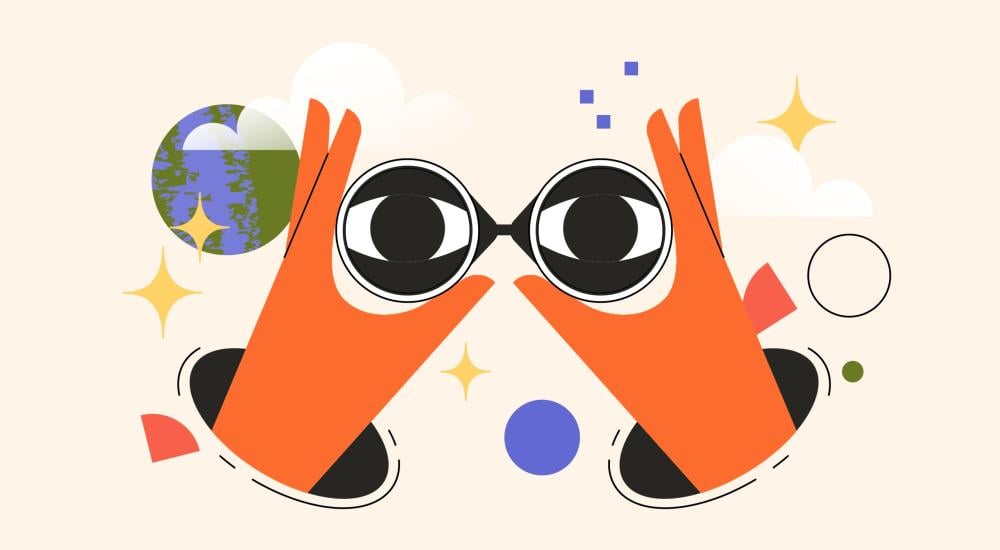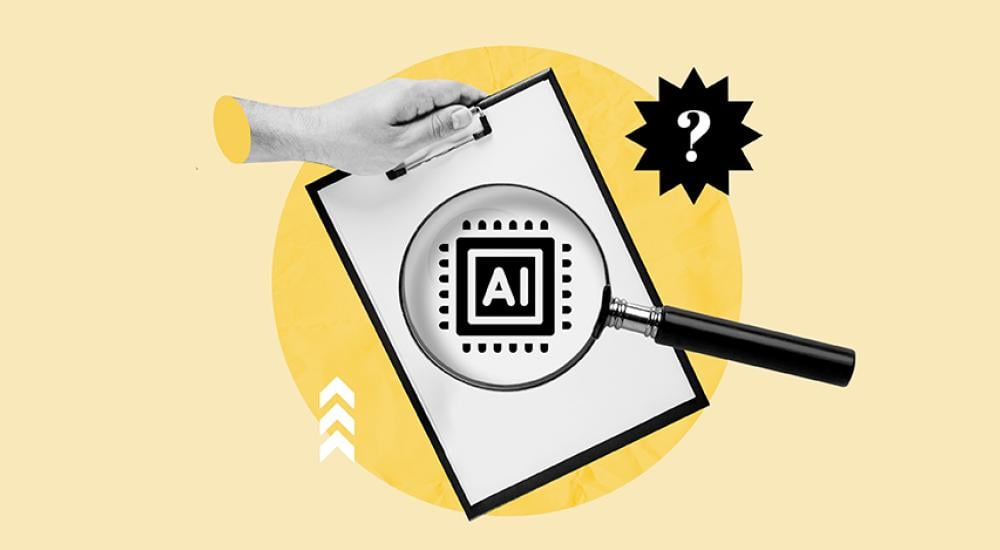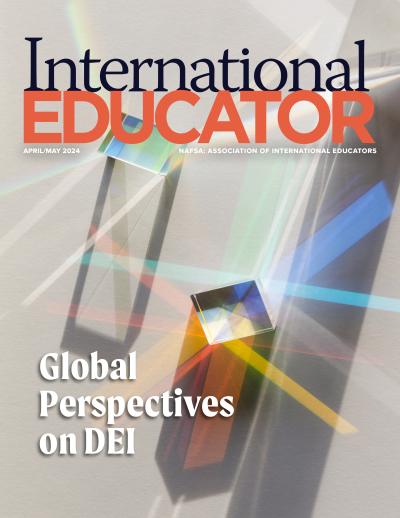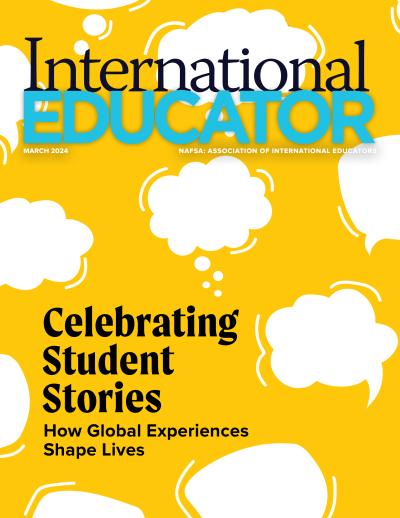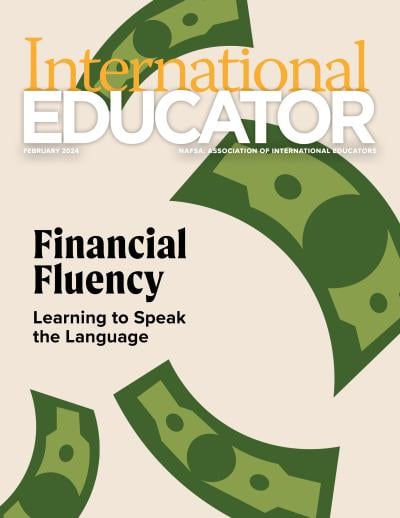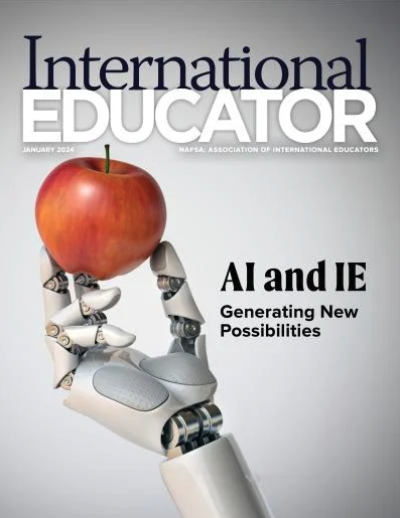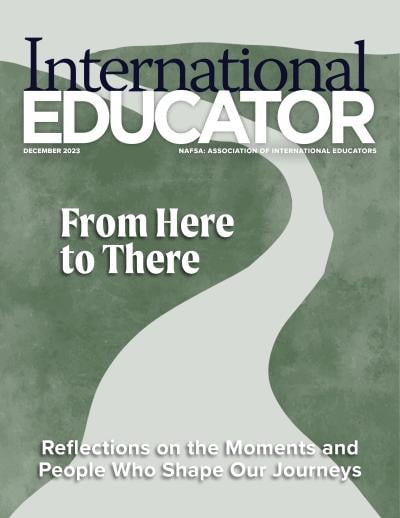Luis von Ahn: The Power of Language

Luis von Ahn’s story sits at the intersection of education and technology. As an international student from Guatemala, Luis attended both Duke University and Carnegie Mellon University—experiences that significantly shaped his journey. He went on to co-invent CAPTCHA, an internet security feature that has become a ubiquitous part of our digital lives, and he also co-founded two multimillion-dollar companies: reCAPTCHA, which was sold to Google, and Duolingo, the popular language learning platform with over 300 million users worldwide. His work has broken barriers and democratized access to technology and education.
International Educator spoke with von Ahn about the power of international education, the importance of diverse perspectives, and his ambition to provide equal access to education. Hear more from von Ahn at the NAFSA 2024 Annual Conference & Expo, where he will be in conversation with Fanta Aw, NAFSA’s CEO and executive director, on Tuesday, May 28, at 9:30 a.m.
You were an international student at Duke University and Carnegie Mellon University. Can you share about your experience on those campuses? Are there parts of those experiences that have informed the path that you've taken?
I came as an international student, first at Duke for undergrad; I came straight from Guatemala to Duke. I loved it. It was the best decision I've ever made, coming to the United States. I felt a lot more like an international student at Duke than I did at Carnegie Mellon. By [the time I got to] Carnegie Mellon, I had been here for so long that I kind of didn't feel like an international student anymore. More than three-quarters of the PhD students in my program there were international. But yeah, I loved it.
Interestingly, [my experience] is related to our work on the Duolingo English test, because to come to Duke, I had to take the TOEFL. And I had one of those nightmare scenarios. I lived in Guatemala, but they ran out of seats—so I had to fly to El Salvador to take the TOEFL. I don't remember the exact cost of that, but it was probably $1,000 or so to take the TOEFL. It was also an insane amount of time expenditure for something that should have been super easy.
It’s not like at the time I thought, “I can do better;” that's not true. But years later, when we were working on the Duolingo English test, I remembered the experience that I had. I thought, “If we could have these tests online, that wouldn't have happened to me back then.” So that’s related [to my experience as an international student]. Fortunately, to go from Duke to Carnegie Mellon, I didn't have to take a TOEFL, because I was already in the United States.
So much of your success has come from asking good questions and solving both big and small problems. When it comes to higher education, what are some of those questions that we're not asking that we should be asking? And what are some of the problems that need to be addressed?
There's a number of problems. One of the biggest ones is just being able to give equal access to everybody, particularly [in] higher education and particularly [in] the U.S. system and particularly [in] the elite U.S. system.
The opportunities are pretty biased toward those who already have means. As much as universities try for this not to be the case, if you look at who's actually attending the very elite universities, they're mostly pretty wealthy people from the usual suspect high schools and usual suspect countries. I think one of the things that would be best for the world is if everybody had equal access, or at least equal opportunity. I don't think that's true today.
Generally, doing more things that give equal access is really important. That’s one of the biggest things that I think we can do.
I’m very happy with the Duolingo English test that we're able to help with this. Obviously, we cannot make everything equal opportunity just because of the Duolingo English test. But the fact that people can take tests, where before they couldn't take them—it really does broaden the candidate pool, at least.
Generally, doing more things that give equal access is really important. That’s one of the biggest things that I think we can do. The higher education system in the United States works, in that people learn, and it is probably the best in the world. So, it works in that respect. I just wish it could be more egalitarian.
To that point, when you mentioned flying to El Salvador to take TOEFL, I wondered, how many potential students didn't have those resources?
I was very fortunate. I like to say that I did not grow up rich, but I received the education of a rich kid. I was an only child, and this is very rare for a country like Guatemala. My mother basically spent all her resources on my education. So, I happened to go to the best school in Guatemala, and I saw what it did for me to get the rich kid education. But it really would have been a big, big difference if my mom had not spent all her resources on my education. I would have received a middle-of-the-road Guatemalan education, which happens to not be all that good, and I wouldn't be where I am today.
On the topic of creating equal access to education, when you were creating Duolingo, how did you determine that language learning was a solution to the problem of access to education?
We started not with language learning; we started with education. We thought, “Okay, we're going to teach something.” We didn't know what we wanted to teach, but we wanted to do two things: We wanted to teach something via computer or phone, and we wanted to make sure that it was free. And we really cared that it's free—that's the equal access component.
But, at first, we didn't know that we wanted to do language learning. We actually considered doing math or programming, but in the end, we decided to get started with language learning. And the reason for that was because of English. It turns out, there's a lot of people learning English—about 1.5 billion people in the world. English is also this amazing thing, that if you learn English, immediately you can make more money. It's direct. Just by knowing math, you can't make more money; usually [you] have to learn math to learn physics to become an engineer. It’s multiple steps. Whereas with English, if you were a waiter and now you know English, you can be a waiter at a hotel and make more money. Knowing English is this amazing thing that immediately helps you to get better opportunities. That's why we decided to start with languages.
Language learning is one of the very few things that people want to do outside of school. Not many people want to learn math outside of school.
It's never been the desire to only do languages; so of late, we started teaching math and music, and hopefully we'll expand to other subjects, too. But we thought that learning a language was a good idea.
The other thing that was good about getting started with learning a language is that language learning is one of the very few things that people want to do outside of school. Not many people want to learn math outside of school. I wish more people did. But it's just not a thing, whereas language learning is something that people actually want to do outside of school. Music is one, too. But most things people don't want to learn outside of school, and that has actually been quite useful for us, because our users are of all ages. That wouldn't be true if we were doing a subject that nobody wants to learn outside of school.
We didn't know at the time, but in retrospect, starting with language learning was exactly the right decision.
What are some of the other solutions to solve equal access to education?
Certainly, we thought tests were a big thing because of the barriers that they impose. Generally, I think we're going to have to really figure out how to deliver [education] well over a computer and with AI [artificial intelligence]. It's going to take many years to get really good.
I'm a realist, and I understand that the child of a rich person is probably always going to be able to go to the Harvards of the world. Not even because Harvard teaches better, but because by simply being surrounded by other smart people, they'll probably do better. I don't think we'll ever be able to compete with that. But I do believe that, over time, hopefully there'll be much better opportunities [for all students] using a computer and using artificial intelligence. I don't think elite institutions are going to be disrupted by AI and computing. But I do think that the bottom [tiers of institutions] all over the world are going to do a lot better.
Going back to kind of language learning—how do you view the power of language to foster connections across borders and cultures?
Right, and it's not just English; we emphasize English because it is the common language that people throughout the world want to learn and the one that gives you best access to really good educational opportunities because of U.S. institutions, or UK, Canadian, or Australian institutions. So English really matters. But all the other languages matter, too. We really are able to get people to communicate better with each other. Learning somebody else's language helps you get closer to them. We see that a lot.
One of the things that I'm most proud of is that Duolingo has been used throughout Europe by refugees who've settled in all these countries to learn the language of that country.
One of the things that I'm most proud of is that Duolingo has been used throughout Europe by refugees who've settled in all these countries to learn the language of that country. So, in Sweden, refugees are learning Swedish; in France, they're learning French. And it’s really helping them be part of society. If you're in a country and you can't really speak the language, you're at a disadvantage.
One of the arguments in favor of international education is that diverse perspectives are needed to solve the world's big and small problems. How have you seen that in your own career?
Even myself, I don't think I would have started a language-learning company had I not been a person who had to move countries and had to learn English. This is not just true of me—my cofounder also is a nonnative English speaker. So, the fact that we're nonnative English speakers changed our lives.
From another point of view, at Duolingo we try to hire people with very diverse perspectives, particularly to develop our product, which is used in every single country in the world. There's just stuff that we know because we have these perspectives. And when you don't have these people, you would never know these things. For example, it turns out that in many poorer countries people don't mind watching a lot of ads on apps. Your average American who uses apps is like, “I hate ads!” But because we have product managers in the company that come from some of the poorer countries, they know that people don't mind that. This is the type of stuff that you get to know if you have very diverse perspectives of how things operate in different countries.
What can people working in the international student office do to make international students feel valued and supported?
First of all, my experience is from a million years ago, but from talking to people, I think this is still true. And it’s not that they do anything wrong. But the level of kind of know-how of how the system works between an international student and somebody who grew up in a wealthy suburb in the United States is night and day. The person who grew up in a wealthy suburb in the United States knows all the ins and outs of what universities look for, the minimum score on the SAT, etc. They know all the little ins and outs. Whereas international students many times are completely clueless about this type of stuff. The more education there can be about these ins and outs, the better.
In general, I think there's a lot of anxiety that students have when they first arrive on campus, because they don’t know what it’s going to be like. I don't think I'm saying anything that the international offices don't know, but there's a huge level of disparity in knowledge, of how the system works. I was absolutely clueless about how the system worked before I got here; I had no idea. For instance, in a country like Guatemala, the concept of selective admissions doesn't really exist. It does a little bit, but if you apply to a university, you just get in, unless you have a criminal record or something's really wrong. So, this idea that 5 or 10 percent of the people who apply get in, it's just so foreign. The more education around the ins and outs of the system, the better. •
About International Educator
International Educator is NAFSA’s flagship publication and has been published continually since 1990. As a record of the association and the field of international education, IE includes articles on a variety of topics, trends, and issues facing NAFSA members and their work.
From in-depth features to interviews with thought leaders and columns tailored to NAFSA’s knowledge communities, IE provides must-read context and analysis to those working around the globe to advance international education and exchange.
About NAFSA
NAFSA: Association of International Educators is the world's largest nonprofit association dedicated to international education and exchange. NAFSA serves the needs of more than 10,000 members and international educators worldwide at more than 3,500 institutions, in over 150 countries.
NAFSA membership provides you with unmatched access to best-in-class programs, critical updates, and resources to professionalize your practice. Members gain unrivaled opportunities to partner with experienced international education leaders.



